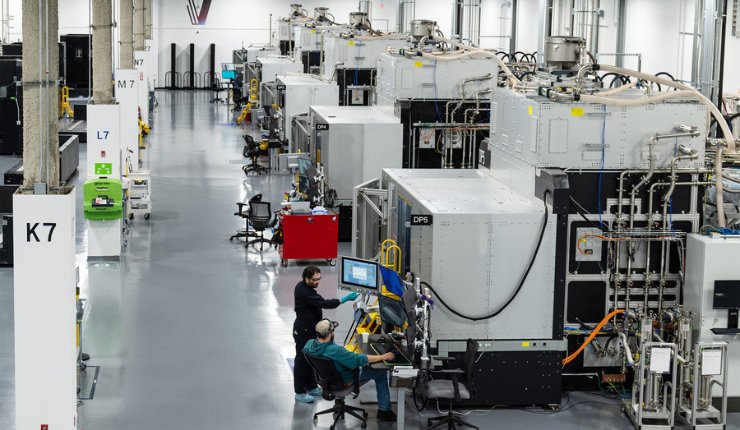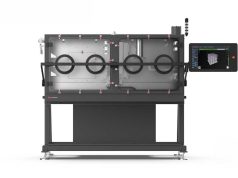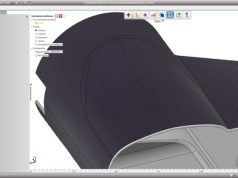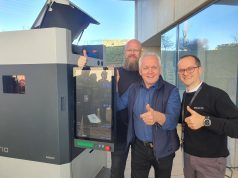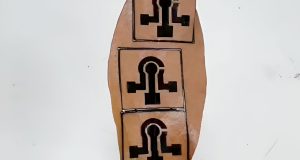VulcanForms was founded in 2015 by Martin C. Feldmann and MIT professor John Hart. The goal was to commercialise the “world’s first” industrially scalable solution for additive manufacturing of metals with lasers. Earlier this year, the start-up received $355 million in funding. Now the team could announce the construction of its first digital manufacturing facility in Devens and Newburyport, Massachusetts.
At the heart of each of those workflows is a proprietary laser powder bed fusion (LPBF) metal 3D printer that uses an array of finely choreographed laser beams to produce high performance metal parts with complex designs. The printers are integrated with VulcanForms’ machining, robotics, and postprocessing equipment through a digital thread that also monitors parts as they’re produced.
“Even though LPBF technology is well-established for several applications including jet engine fuel nozzles and orthopedic implants, it’s barely scratching the surface of the opportunity,” Hart says. “VulcanForms sees a tremendous market opportunity to realize additive manufacturing at industrial scale and integrate it with a digital production system.”
VulcanForms is currently producing parts for companies in the medical, defense, semiconductor, and aerospace industries, turning designs into finished parts in a matter of days. The founders say VulcanForms’ quality exceeds industry standards with materials like titanium as well as nickel-based and advanced steel alloys.
VulcanForms is currently completing its first two digital manufacturing facilities in Devens and Newburyport, Massachusetts. When it’s done, the Devens facility will house several dozen of the company’s additive manufacturing systems in addition to having postprocessing capabilities. The founders say those systems will make Devens the highest-throughput metal additive manufacturing facility in the world. The Newburyport facility focuses on precision machining, industrial automation, and assembly operations. Merging these technologies with a digital thread, VulcanForms is building U.S.-based digital manufacturing infrastructure that the founders say will define the way products are designed, built, and delivered.
VulcanForms’ production foundry also includes CNC machining and post processing equipment, and the founders say the company’s software stack is a key differentiator.
“From the start, we saw 3D printing as a cornerstone of digital manufacturing, where the software and hardware work hand-in-hand to encode and execute production instructions,” Hart says. “We’ve built the software that allows each part to receive the same temperature locally in each voxel in each layer. It also allows us to move quickly to the end product while maintaining that consistency in production.”
Ultimately the founders are focused on what those capabilities unlock for customers.
“What really gets me excited is how we’re able to take a customer part and turn it into reality in a production setting — not in a coat hanger or desk ornament setting,” Feldmann says. “Everyone in additive is just super excited about what a 3D printer can do and not how this works in a production value stream. That’s why we have an entire production value stream in house. It’s why our motto isn’t ‘VulcanForms: 100 kilowatts laser power in a printer.’ It’s ‘VulcanForms: accelerating innovation.’”
Helping 3D printing reach its potential
Last year, a supercomputer manufacturer sent VulcanForms designs for a cooling component in its processors. The titanium part, which contained dozens of microscopic tunnels, was so complex it could only be made using additive manufacturing. As The New York Times reported, VulcanForms came back with a part two days later.
VulcanForms has also produced medical implants, industrial tooling and tire molds, and components for aviation and defense contractors.
Feldmann sees innovations enabled by additive manufacturing driving technological progress in a number of industries.
“I don’t think there are going to be orthopedic implants that aren’t LPBF-printed in the future,” Feldmann says.
That technological progress, in turn, will yield even more use cases.
“The only thing I’m 100 percent sure of is the highest-value applications for additive manufacturing have not yet been found,” Feldmann says.
The company also sees the transformation of manufacturing enabled by digital production technologies as an opportunity for the United States to improve both economic prosperity and its ecosystem of innovation.
“VulcanForms believes that one of the greatest opportunities in the United States is rebuilding its industrial ecosystem around digital production systems,” Hart says. “Digital-first production technologies, including additive manufacturing and automated precision machining, enable more innovative, resource efficient, and resilient supply chains. Innovation in manufacturing is the backbone of the American economy.”
Find out more about VulcanForms at vulcanforms.com.
Subscribe to our Newsletter
3DPresso is a weekly newsletter that links to the most exciting global stories from the 3D printing and additive manufacturing industry.



